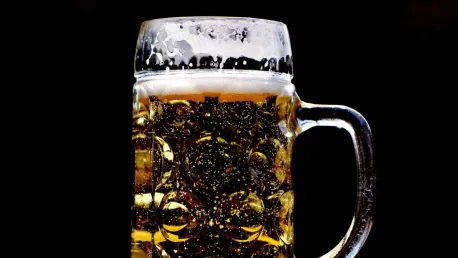The no- and low-alcohol drinks market is currently experiencing an unprecedented period of growth driven by a global shift towards health consciousness and wellness. With a projected compounding annual growth rate (CAGR) set to increase by 4% in volume through 2028, it is the no-alcohol segment leading the charge with an impressive 7% volume CAGR. This substantial growth underscores a significant consumer trend toward moderating alcohol consumption, reflecting broader wellness trends. According to market analysts from IWSR, the no-alcohol category is anticipated to contribute incremental growth exceeding $4 billion by 2028, signifying not only vast market potential but also a paradigm shift in consumer preferences.
Innovative Offerings and Product Launches
Mash Gang’s Creative Non-Alcoholic Beers
Mash Gang, an innovative alcohol-free brewer, has made a notable impact on the market with the release of three new non-alcoholic beers in January. These creative offerings include a classic cerveza, a mango IPA, and a chocolate cherry stout, each meticulously crafted with unique flavor profiles and premium ingredients. “Glug” Tropical Cerveza reimagines the traditional cerveza style by incorporating tropical notes derived from Citra and El Dorado hops, while also including corn to achieve an authentic taste. On the other hand, “Journey Juice” Mango IPA blends bold flavors of mango and chili to create a distinctive beverage that is simultaneously sweet, sour, and spicy. Lastly, “Lesser Evil” Chocolate Cherry Stout offers a decadent vegan and dairy-free brew, combining rich chocolate, oats, and cherry juice with a modest 0.5% ABV, presenting a sophisticated alternative to traditional stout beers.
The adventurous approach of Mash Gang in formulating these non-alcoholic brews exemplifies the broader trend within the no- and low-alcohol market towards innovation and diversity in flavor. By leveraging high-quality ingredients and inventive flavor combinations, Mash Gang appeals to a wide range of consumers seeking to enjoy complex and enjoyable beverages without the effects of alcohol. These new introductions not only enrich the product offerings in the market but also set a benchmark for creativity and quality in the non-alcoholic beverage segment.
Cann’s Ginger Lemongrass Beverage
Cann’s Ginger Lemongrass beverage presents a remarkable innovation in the no- and low-alcohol segment, offering a unique and sophisticated alternative to conventional drinks. Made with sparkling water, fresh juice, organic Mexican agave, and premium THC and CBD distillates, Cann’s microdosed formula is crafted to appeal to consumers seeking a balanced, craft cocktail-like experience. This refreshing beverage, available in variations such as Roadies, Cann, and Hi Boy, caters to differing preferences by offering varying THC and CBD content levels. Its ginger-infused flavor profile provides a smooth yet tangy taste, making it an appealing choice during Dry January and beyond.
The success of Cann’s Ginger Lemongrass beverage highlights the growing demand for non-traditional, wellness-focused drinks that offer both flavorful complexity and calming effects. By incorporating high-quality natural ingredients and precise microdosing, Cann creates a product that is not only enjoyable but also aligned with the ethos of modern health and wellness movements. Its continued popularity and varied product offerings illustrate a significant trend towards exploring and experimenting with new, functional ingredients in the no- and low-alcohol market.
Legacy Brands and Market Transformation
ARIEL Vineyards’ Brand Refresh
ARIEL Vineyards, a longstanding brand in the alcohol-free wine sector since 1985, is undergoing a notable transformation with a refreshed brand identity and packaging. As part of its strategy to appeal to contemporary consumers, J. Lohr Vineyards & Wines, ARIEL’s parent company, offers premium Chardonnay and Cabernet Sauvignon wines that have had their alcohol content meticulously removed through a patented reverse osmosis process. This method ensures that the complexity and character of traditional wines are maintained. The redesigned labels are light and airy, featuring botanical illustrations that resonate with themes of wellness and balance, while updated packaging employs environmentally-friendly elements, such as lightweight bottles and screwcap closures, emphasizing the brand’s commitment to sustainability.
The strategic makeover of ARIEL Vineyards aims to captivate a broader, more health-conscious audience by pairing high-quality, sophisticated drinking experiences with a modern visual identity. This transformation significantly enhances the brand’s market positioning and reflects the evolving consumer preferences for non-alcoholic beverages that do not compromise on taste or presentation. By aligning with these values, ARIEL positions itself as a leader in the premium alcohol-free wine segment, setting a standard for quality and sustainability.
Botivo’s Limited-Edition Barrel-Aged Aperitivo
Botivo has made headway in the no- and low-alcohol market with its collaboration with Berry Bros. & Rudd to launch a limited-edition, barrel-aged aperitivo with an ABV of just 1%. This innovative product, developed over three years, merges complex flavors resulting from aged British apple cider vinegar rested in Islay whisky barrels. This process results in a unique elixir with smoky, woody, and bittersweet flavor profiles, further enriched by botanicals such as cherry bark, gentian, and wildflower honey. This collaboration demonstrates a dedication to craftsmanship and creativity, pushing the boundaries of what non-alcoholic beverages can achieve.
By introducing such a distinct product, Botivo highlights the potential for innovation and diverse flavor experiences within the no- and low-alcohol market. The limited-edition aperitivo appeals to consumers looking for sophisticated and mature taste experiences without the higher alcohol content. This venture underscores an ongoing trend towards premiumization and experimentation in this evolving market, setting a precedent for future product innovations.
Functional Beverages and Celebrity Endorsements
Kin Euphorics’ Matchatini
Kin Euphorics, a pioneering functional beverage brand in the U.S., has recently introduced Matchatini, a product developed in partnership with acclaimed wellness expert Dr. Andrew Weil. This unique drink aims to support optimal brain health by combining matcha and medicinal mushrooms, such as ashwagandha, maca, and maitake mushrooms, creating a beverage that both energizes and provides a sense of calm. Matchatini is Kin Euphorics’ third concentrate in their made-to-mix line, underscoring the brand’s commitment to sustainable, indulgent alcohol alternatives.
The collaborative effort behind Matchatini reflects the growing consumer interest in functional beverages that offer health benefits beyond simple refreshment. By incorporating adaptogenic ingredients known for their stress-relief and cognitive enhancement properties, Kin Euphorics creates a product that aligns with consumer demand for wellness-oriented drinks. Matchatini’s reception illustrates the potential for growth in this sector, as consumers continue to seek out innovative, beneficial alternatives to traditional alcoholic drinks.
Kylie Minogue’s 0% Sparkling White Wine Alternative
In a significant development for the non-alcoholic wine sector, pop icon Kylie Minogue has expanded her wine range with the introduction of Kylie Minogue 0% Sparkling White Wine Alternative. This innovative product employs a cutting-edge production process to ensure it contains no alcohol while maintaining the delicate flavors typically associated with traditionally fermented wines. Featuring subtle jasmine notes and a refined finish, Kylie 0% follows the hugely successful launch of Kylie 0% Sparkling Rosé, which has considerably boosted the non-alcoholic wine segment in the UK. This excellent foray into the U.S. market marks the escalating demand for premium, non-alcoholic wine options, driven by an increased awareness of health and wellness.
Kylie Minogue’s influence has been instrumental in reshaping consumer perceptions toward non-alcoholic wine, making it a viable and fashionable choice for those seeking elegant yet alcohol-free alternatives. The continued expansion of her wine range reaffirms the growing popularity of high-quality non-alcoholic beverages amongst a discerning audience. This trend signifies a broader shift in the industry towards offering sophisticated drinking experiences that cater to a health-conscious and lifestyle-focused consumer market.
Expanding Market and Ethical Consumption
Thornbridge Brewery’s Alcohol-Free Jaipur IPA
The UK’s Thornbridge Brewery, known for its nearly two-decade-old flagship Jaipur IPA, has made significant strides by adding an alcohol-free version of this celebrated product to its portfolio. This new offering retains the iconic American hop flavors that fans of the original Jaipur IPA cherish. By introducing an alcohol-free variant, Thornbridge Brewery not only addresses the growing demand for non-alcoholic alternatives but also honors its tradition of brewing excellence.
The launch of alcohol-free Jaipur IPA signifies a pivotal moment for Thornbridge Brewery and reflects a larger industry trend where established brands are innovating to meet changing consumer preferences. Maintaining the iconic taste profile while eliminating the alcohol content is a testament to the advancements in brewing techniques and the ability to cater to a broader audience without sacrificing quality. This move indicates a deeper commitment to inclusivity and consumer choice within the craft beer industry.
Kakadu Kitchen’s ‘Conscious Drink’ Line
Emphasizing sustainability and ethical sourcing, Kakadu Kitchen, in partnership with social enterprise OzHarvest Ventures, has relaunched its ‘Conscious Drink’ line. This collection includes a lightly sparkling wine-alternative made from rescued blueberries and native Australian botanicals. By ethically sourcing ingredients from First Nations-owned businesses, this product not only reduces food waste but also supports local communities and promotes sustainable practices. The ‘Conscious Drink’ line appeals to a rising demographic of eco-conscious consumers who value transparency and responsibility in their purchasing decisions.
Kakadu Kitchen’s approach to creating beverages from rescued and ethically sourced ingredients taps into the growing movement towards sustainability and ethical consumption within the no- and low-alcohol market. This initiative demonstrates that it is possible to produce delicious, high-quality beverages while also making a positive impact on the environment and society. The relaunch highlights the broader industry trend towards integrating sustainability into product offerings, catering to a growing consumer base that prioritizes ethical and environmental considerations in their choices.
American Wine Brand 90+ Cellars Ventures into Non-Alcoholic Market
American wine brand 90+ Cellars has taken a strategic step into the non-alcoholic market with the introduction of its first non-alcoholic wines: a Sparkling Brut and Sparkling Rosé. Crafted using traditional winemaking methods, these wines undergo a reverse osmosis process to remove alcohol while preserving the authentic flavors. With low calories and sugar, these beverages cater to health-conscious consumers and are priced accessibly at $12 per bottle, making them an attractive option for a wide audience.
The transition of 90+ Cellars into the non-alcoholic segment underscores a broader shift in the wine industry towards offering diverse, health-oriented products without compromising on taste. By maintaining the traditional winemaking process and eliminating alcohol, the brand ensures that consumers can enjoy a sophisticated wine experience while adhering to their wellness goals. This move highlights the increasing relevance of non-alcoholic options in the beverage market and the potential for continued growth as consumer preferences evolve.
Common Themes and Future Directions
The market for no- and low-alcohol beverages is witnessing remarkable growth, fueled by a worldwide shift towards health and wellness. Consumers are becoming more health-conscious, leading to a notable trend in reducing alcohol intake. This shift is reflected in the market’s projected compound annual growth rate (CAGR), which is set to rise by 4% in volume by 2028. The no-alcohol segment stands out in particular, boasting an impressive 7% volume CAGR.
This rapid growth highlights a significant movement towards lower alcohol consumption, reflecting wider health and wellness trends. According to market research by IWSR, the no-alcohol category is expected to add more than $4 billion in incremental growth by 2028. This projection signals not only enormous market potential but also a major shift in consumer preferences.
The increasing demand for no- and low-alcohol options is evident in various market segments, from retail to hospitality. Companies are innovating and expanding their product lines to cater to this growing consumer base. This shift not only reflects changing attitudes towards alcohol but also opens up new opportunities for businesses to meet the demands of the health-conscious consumer.
Overall, the expanding no- and low-alcohol drinks market underscores a broader trend towards wellness and mindful consumption. This is a clear indicator of the changing landscape in consumer behavior and preferences, heralding a new era for the beverage industry.









